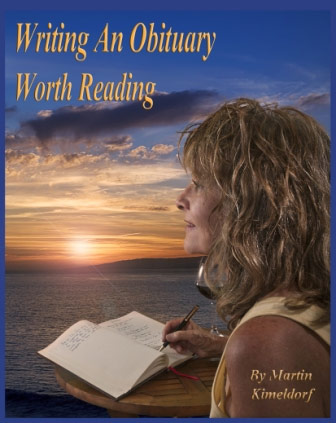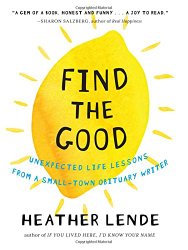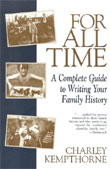“Memoir Man” a Born Storyteller
Brandon Sun, September 19, 2009
David McConkey
Interviewing Fred McGuinness about memoir writing is not as simple as getting answers to a few questions over lunch. It’s more like trying to harness a runaway train of one entertaining anecdote after another.
McGuinness is the consummate storyteller. And he encourages others to tell their stories, too.
For several decades, McGuinness has been sharing his wisdom at memoir writing workshops. They were first organized by the old extension department at Brandon University, and now by Seniors for Seniors.
Thousands of people have attended over the years.
The workshops, McGuinness says, are about how to “get something out of your head, down your arm, and onto paper.”
The basics of the McGuinness method can be simply stated. Everyone has a life of stories. The writing process brings those stories to life. The most important thing to get started on one’s memoir is to just get started. Spill out the ideas, by timeline or by theme.
“You don’t know how much you know. Every incident and event is filed up here,” he says, tapping his head.
“Your writing is the connecting rod to your old memories.”
For those who protest that they can’t write, McGuinness reports that people keep surprising themselves with what can be done with just a pen and a notebook.
He recommends that would-be memoirists first set aside any notion of writing in an artistic or classical style. He advises a “Dick and Jane” approach: basic declarative sentences that make a point.
“Get the facts down; then we can improve the flow later.”
How does one write about a bad sequence of events in the life of a family, like the baby that comes when it shouldn’t, or even a suicide?
McGuinness advises that the writer record the story exactly as they know it. Leave the manuscript for a couple of weeks. Then read it again: they will know if the contentious part should be kept as is, softened, or left out completely.
The McGuinness philosophy of memoir writing is part of the McGuinness philosophy of living.
“I view my life as being involved in a great learning experience and I’d hate to miss anything.”
That “great learning experience” has so far taken McGuinness from growing up in Brandon to stints as varied as serving in the Second World War to working for the Saskatchewan Golden Jubilee in the 1950s.
Now 88, he is “editor emeritus” of the Brandon Sun, still pens a weekly column, and works on other projects. He has been awarded the Order of Manitoba and the Order of Canada.
The McGuinness stories tend toward the positive, about people learning, growing, and helping. Like the people in a small town in Saskatchewan who organized a dinner theatre to raise funds for the local rink. They then became hooked on the fun of dinner theatres.
Stories of citizens hearing about good things happening in another place, and asking, “Why can’t we do that here?”
McGuinness is the writer of numerous newspaper and magazine articles, a radio broadcaster, and the author of a dozen books.
He knows how difficult it can be to get published. Most memoirs that are written will be for the enlightenment of just family and friends. But that’s OK.
McGuinness is now visually and hearing impaired, but these ailments have opened the door to new stories, new ways to learn, new ways to help. He is delighted to talk about a range of new electronic “assistive devices” that he is learning to use and helping others to use as well.
McGuinness appreciates all of his life, from his childhood to his many adult accomplishments, which he modestly attributes to chance.
“One thing that has made a difference is that I was born into a bookish home.” Books brought into the household were read by all and become the topic of conversations at the dining room table.
“Write an hour a day,” he says, as our conversation winds back to memoir writing.
“What you may find is the time you’re not writing, you’re thinking about what you’re going to write the next day.”
But self-discipline is important. One can’t neglect writing for the week and then try to catch up with seven hours in one day. It doesn’t work that way.
“If you want to understand the course of human history,” McGuinness concludes, “it is important to read memoirs.”
“And to write your own.”
Postscript: Fred McGuinness died on March 22, 2011 at age 90. The headline of his obituary in the Brandon Sun was "A Full and Successful Life."
See Also:
Memoir Writing: Ten Tips
How to Write a Life Story
Six Words To Describe A Life?
A Family History Writing Workshop
Live Well, Do Good
More From Obituary Guide:
- Writing Your Own Obituary Offers Chance for Reflection
- How to Write a Legacy Letter (Ethical Will)
- A Family History Writing Workshop
- Helping Families "Most Satisfying Work" for Funeral Celebrant
- Be Prepared: Will, Health Care Directive (Living Will), and More
Books You May Find of Interest:
Not Quite What I Was Planning:
Six-Word Memoirs

Writing an Obituary Worth Reading:
A Guide to Writing a Fulfilling Life Review

Find the Good:
Unexpected Life lessons From a Small-Town
Obituary Writer

Having the Last Say:
Capturing Your Legacy in One Small Story

Obit:
Inspiring Stories of Ordinary People Who Led Extraordinary Lives
For All Time:
A Complete Guide to Writing Your Family History

Thrive:
The Third Metric to Redefining Success and Creating a Life of
Well-Being, Wisdom, and Wonder

Press Ctrl + D to Bookmark this page

